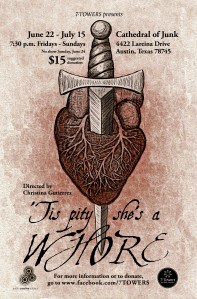June 2012
Directed by Christina Gutierrez-Dennehy
Costumes by Sally Ziegler
Set Design by Aaron Black
Lighting by Christina Gutierrez-Dennehy
Staged at the Cathedral of Junk
From Christina:
I have wanted to direct ‘Tis Pity She’s a Whore from the moment I read it in a graduate seminar seven years ago. It’s not that I find myself particularly drawn to plays about incest, but that this play feels so shockingly modern. Ford’s cynical treatment of religion, his willingness to explore taboos, to question traditional morality and to comment on gender roles, all result in a play that brings the late Renaissance into conversation with the morals, values, and aesthetics of the twenty-first century. Only rarely in rehearsals did we struggle to understand these characters’ beliefs or worldviews, and more often than not, found ourselves commenting on how little seems to have changed across the centuries.
Our post-apocalyptic vision of ‘Tis Pity is a reflection of this textual hyper-modernity, as well as my solution to the difference between Renaissance and contemporary views of incest. Although we tend to think of incest in relation to psychological or sexual disorders, Ford’s audiences would have read Annabella and Giovanni’s relationship in terms of its disruption to Parma as a whole. Textually, this is a group of people deeply and desperately invested in their own survival. As such, notions of communal concern and social engineering were central to my conceptualization of this production. Florio sells his young (and fertile) daughter to the highest bidder out of concern for the community around him. Annabella and Giovanni hide their love not to avoid judgment, but for fear of extreme consequences. Similarly, Ford’s version of Parma is rife with the religious fundamentalism and strict hierarchies which humans tend to turn to in times of deep crisis.
Our Cathedral of Junk is a refugee camp, a ruined city, and, ultimately, a reminder of how dangerous it is to legislate morality. In our heated political climate—in which human rights can be voted upon—nothing seems more relevant than Ford’s 1630 commentary on love and religion. I hope you enjoy this play as much as I do, and find in it something that speaks to you as loudly as it does to me.
PRESS AND REVIEWS
Austin Live Theatre
“[‘Tis Pity] is a tour de force for the recently founded 7 Towers Theatre Company the second smashing artistic success in its eight-month existence. This gives it so far the sort of clean sweep that World War II submarine crews would celebrate by hoisting a broom over the conning tower as they sailed back into port.”
“The actors pronounce this verse crisply and clearly, and they know their scanscion. It’s a great satisfaction to hear “-ion” endings pronounced with a dieresis (split dipthong) as needed to preserve the rhythm.”
https://www.ctxlivetheatre.com/reviews/review-tis-pity-shes-a-whore-by-7-towers-theatr/
Austin Chronicle
“The play’s ending will shock even the most experienced connoisseur of Renaissance tragedies – my reaction was something like, “Damn. Didn’t see that coming.” The last scene is something of a doozy, and hits especially hard because of the cast’s excellent timing and relentless energy. It was one of those special moments when I completely lost myself in theatre and abandoned my critical edge.”
http://www.austinchronicle.com/arts/2012-07-06/tis-pity-shes-a-whore/


Leave a comment